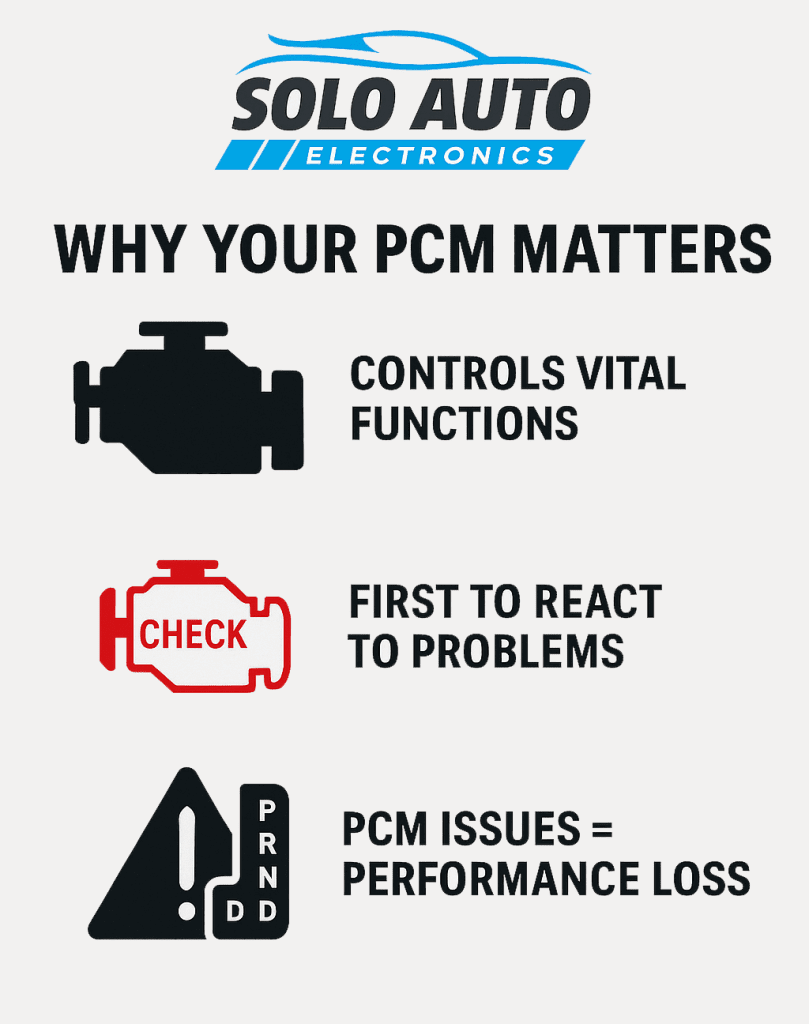Why PCM Replacement Costs Vary — And How to Save Money

If you’ve been quoted a wide range of prices for a new powertrain control module (PCM), you’re not alone. PCM replacement cost can swing dramatically depending on your vehicle’s make, model, year, and even the root cause of the failure. From sourcing OEM vs. remanufactured units to the labor involved in reprogramming, knowing what drives these costs is the first step to saving real money. This guide breaks down what you’re really paying for — and how SOLO helps you get the right PCM at the right price. Get a reliable, pre-programmed PCM without dealer markups at SOLO.
Table of Contents
- What Is a PCM and Why It Matters
- What Drives PCM Replacement Cost
- Common Warning Signs You Need a New PCM
- Why Prices Can Vary Between Shops
- How to Avoid Overpaying for a PCM
- Find the Right PCM for Your Vehicle

What Is a PCM and Why Does It Matter
The Powertrain Control Module (PCM) is the central brain of your vehicle’s engine and transmission systems. It continuously monitors inputs from sensors, then makes split-second adjustments to optimize performance, fuel efficiency, and emissions. If the PCM malfunctions, it can trigger a cascade of problems that affect critical components like spark plugs, fuel injection, and shift timing.
A working PCM ensures your vehicle runs efficiently, meets emission standards, and avoids unnecessary wear on engine components. Symptoms can be hard to trace when they fail, making early diagnosis essential.
Here’s why your PCM matters:
- Controls vital functions: Regulates everything from fuel injection timing to spark plug firing and transmission shifting.
- First to react to problems: Detects faults and triggers the check engine light, giving you the first sign of trouble.
- PCM issues lead to performance loss: A faulty PCM can cause stalling, misfiring, gear slipping, and rough idling.
If you’re experiencing any of these symptoms, a PCM failure could be the cause, and replacing it quickly could save you from bigger, more expensive repairs.
What Drives PCM Replacement Cost
Getting an accurate estimate for PCM replacement can be tricky. Prices vary widely depending on your vehicle, the condition of your existing unit, and where you source the replacement. Whether you’re dealing with a common issue or a rare failure, understanding these cost factors helps you make smarter repair decisions.
Key Factors That Influence PCM Replacement Cost
- Vehicle Make & Model: Some vehicles require specialty PCMs that are harder to find or more expensive to program.
- ECM Integration: In many cases, the engine control module and PCM are combined, increasing both labor and hardware costs.
- Programming Needs: Modern PCMs must be coded to match your VIN, engine sensors, and security systems, adding to labor time.
- Impact on Performance: PCM problems often lead to poor engine performance, misfires, or rough shifting if not addressed quickly.
Unit Availability Can Affect Pricing
One of the most overlooked cost factors is simply the availability of replacement units. Older, high-demand, or limited-production models often require hard-to-find PCMs, which can drive up the price. New or remanufactured auto computers may also vary in cost based on supply chain availability and compatibility.
When sourcing a replacement unit:
- Check the part number to ensure an exact fit
- Compare costs between new, used, and remanufactured options
- Confirm the unit includes or allows for programming to your specific vehicle
- Look for warranties or return policies to protect your investment
These steps can help avoid delays and prevent overpaying, especially when your vehicle is down and you’re in a time crunch.
Common Warning Signs You Need a New PCM
Before committing to a costly repair, it’s essential to know whether your vehicle’s problems stem from the powertrain control module (PCM). Because PCM problems often mimic other mechanical or electrical issues, they can be tricky to diagnose without proper testing. However, specific symptoms are more likely to point directly to PCM issues, especially when multiple systems are affected simultaneously.
Left unchecked, a failing PCM can escalate from minor glitches to complete vehicle shutdown. Knowing the warning signs can help you act early, avoid more profound engine damage, and manage the average replacement cost more effectively.
Signs to Look Out For
If you notice any of the following, it may be time to inspect your PCM:
- Persistent Check Engine Light: If the light comes back even after repairs, your PCM may not process codes correctly.
- Random Electrical Issues: Power windows, locks, or dashboard lights acting up can signal deeper PCM-related faults.
- Engine Misfires or Stalling: Irregular fuel delivery or ignition timing, especially when no other cause is found, often points to PCM problems.
- Transmission Trouble: Harsh shifting or stuck gears can indicate the PCM isn’t communicating correctly with transmission systems.
- Burnt Smell in the Engine Bay: Internal short circuits in the PCM can generate heat and leave behind a noticeable odor under the hood.
Why Prices Can Vary Between Shops
PCM replacement costs often depend on where you buy. Online suppliers usually offer lower prices than local shops. That’s because digital sellers have lower overhead, faster sourcing, and sell directly to vehicle owners and mechanics. Physical shops often mark up parts and include added labor or storage costs, which raises the total repair cost.
Another reason for the price gap is that some sellers only offer the PCM—no testing, programming, or diagnostic support. If the PCM isn’t matched correctly or deeper underlying issues are missed, you could have drivability problems, poor fuel efficiency, or faulty transmission functions.
Why It Helps When a PCM Supplier Has a Repair Center
Suppliers with in-house repair centers offer a big advantage. They can inspect, rebuild, and reprogram units before shipping. That means the internal components are verified, the software is up to date, and the unit is more likely to work right the first time. It also helps prevent surprises later and keeps the overall repair cost in check.
How to Avoid Overpaying for a PCM
The best way to avoid overspending on a powertrain control module is to start with a reputable PCM supplier. A good seller offers fair pricing, ensures compatibility, provides tested units, and supports you with a reliable customer service team. Many PCM issues arise not from the unit itself, but from mismatched parts, poor programming, or misdiagnosed problems—so choosing the right source from the beginning can save you time and money.
Keep in mind that modern vehicles rely on highly integrated control systems. Replacing a PCM isn’t just about swapping hardware; it’s about precision, programming, and long-term reliability.
Here’s how to avoid hidden fees and get real value:
- Start with the right supplier: Choose a PCM seller known for accurate part matching, proper programming, and responsive support. Look for reviews that highlight fast turnaround and successful installs.
- Account for additional costs: The price of the PCM is only part of the total. Budget for programming (if not pre-programmed), shipping, and diagnostic labor, especially if the unit needs to be synced to your car’s security system.
- Know your part number: PCM pricing varies across a wide variety of makes, models, and years. Searching by your OEM part number ensures you get the correct module without paying for the wrong one.
- Avoid dealer markups: Dealerships often charge a premium for the same PCM units available elsewhere. You can usually get the same result at a lower price without sacrificing quality.
- Ask questions before you buy: A helpful customer service team should be able to verify compatibility, confirm what’s included, and guide you through any pre-install steps.
Savvy buyers focus on the unit’s quality and the service that comes with it. That’s how you avoid surprises and make your powertrain control module investment count.
Find the Right PCM for Your Vehicle

PCM pricing can vary for good reason—vehicle compatibility, part availability, labor, and seller practices all play a role. Knowing what affects cost puts you in control and helps you avoid unnecessary expenses. Whether you’re dealing with shifting issues, a check engine light that won’t go away, or a suspected failure in your powertrain control module, the key is choosing the right replacement from a source that understands the needs of modern vehicles.
Ready to get back on the road with confidence? Find your PCM best fit for your vehicle with us — tested, programmed, and built to match your make and model.




